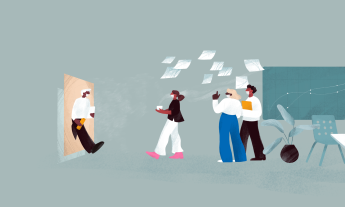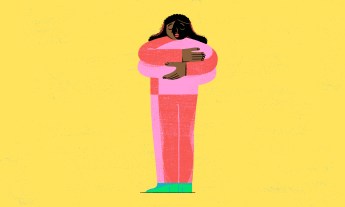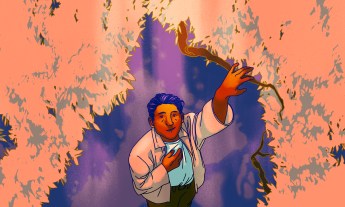
If your self-worth seems to rise and fall according to what other people think, you’re not alone. But you can challenge this mindset and find a new way of valuing yourself, says psychologist Meag-gan O’Reilly.
This post is part of TED’s “How to Be a Better Human” series, each of which contains a piece of helpful advice from someone in the TED community. To see all the posts, go here.
“How often do you get asked ‘What do you do?’ and feel like that question is going to determine how much attention or respect you receive?” That’s a question posed by Meag-gan O’Reilly, staff psychologist at Stanford University’s Vaden Health Center in Palo Alto, California, in a TEDxSJSU talk.
Perhaps you had the stomach-sinking experience of seeing your questioner’s face change or their eyes glaze over when they hear your response. It’s lousy. Instead of being seen and appreciated for all of your complicated individuality, you feel like your worth has been judged in a flash — and found wanting.
But getting a nod of approval is also unsettling, says O’Reilly. “Even those of us who seem to be winning at these conditions stand to lose because conditions change with time, age or unexpected hardships.”
O’Reilly recalls a vivid example from her own life. Once, at a party, she went up to the host — someone she’d never met before — to thank him for his hospitality. She smiled, stuck out her hand, and, she recalls, “I was met with the response of ‘Qualify yourself.’ … That’s when his friend beside him reiterated the question with more clarity: ‘Qualify yourself; tell him why he should talk to you.’”
O’Reilly says, “Immediately my mind split into two paths. The first and more dominant voice got to work on the task … What are the bells and whistles of my existence that I can showcase to woo and persuade this person I’m worth his time?”
Meanwhile, the other part of her was stunned, as she put it, that “there was a litmus test for conversation. I’m happy to say that this part of me won out. I didn’t engage. I simply said, ‘Thanks again for hosting’ and walked away.”
This incident spurred O’Reilly to think about how small moments like these can chip away at our self-worth. “As a psychologist who’s heard and held hundreds of human stories, I have witnessed firsthand how this mentality of feeling like you are not enough has stolen dreams, ambitions, relationships, health and happiness away from people,” she says.
For some of us, these encounters echo earlier occasions in our lives when we felt like our value as a person was determined by other people — usually adults — and fluctuated depending on what they thought of our latest grade, game, performance or accomplishment. O’Reilly says, “Think to yourself for a moment: What were some of the early messages you received about who you needed to be to show up in the world as meaningful?”
No matter how deep-rooted these experiences and feelings are, we can free ourselves from thinking that we’re not enough. This undoing may take a while to happen so we should be patient, cautions O’Reilly. “It’s a process, and I call it lifespan work.”
Here’s how we can start challenging the not-enough mindsets in ourselves and in the people around us, according to O’Reilly.
1. Do what makes you — not other people — happy.
Feeling like you’re not enough can sometimes lead you to take on certain friends, hobbies, projects or jobs that you think will make you look good in other people’s estimation. O’Reilly asks: “When was the last time you did something not because it’s going to show up on your resume, not because it meets that condition of worth you’re wrestling with, but just because you enjoyed it?”
It’s important to pursue the things that you genuinely enjoy because “it softens our stance toward ourselves,” says O’Reilly. “It allows us a zoomed-out perspective and gives us a chance to experience ourselves and others in a non-conditional way.” When you’re in the flow of doing what you love, you can shake off the weight of judgements and expectations.
2. Recognize that you have value — period.
Believing you’re enough does not mean that you should lower the bar for what you’d like to accomplish in life, emphasizes O’Reilly; it’s just that your personal enoughness remains constant and isn’t affected by your actions. She says, “Please go and achieve much. But do it in such a way that you know there’s a floor or a baseline of worth that you cannot descend below.”
Contrary to what some people fear, recognizing our inherent self-worth does not mean that we’ll be full of our own self-importance. O’Reilly says, “An inflated sense of self-esteem sounds like … ‘I can do it, I’m the best,” whether or not that’s actually true.” Inherent value, she adds, “sounds like ‘This is important to me, and I’m going to do my best … but it doesn’t define me.’”
3. When you meet new people, go beyond your job, title or school.
If we’d like to remove the judgment associated with the “So, what do you do?” question, we can also change how we respond to it. “The next time someone asks you what you do, don’t provide an occupation or field of study,” says O’Reilly. “Instead, share with them something that you cherish about yourself; try to break interpersonal ground with them and not start with labels.” (For more advice on the topic, read the TED Ideas article “How to introduce yourself so you’ll be unforgettable — in a good way.”)
4. Respond with love and acceptance to the successes and failures of your family, friends and colleagues.
Similar to the previous point, we need to try to model a new way of being if we want to ease the not-enough mindset in the people around us. Given how achievement-oriented society can be, says O’Reilly, “this is difficult … but a person is not a product and we need a culture that delineates the two and helps us see that one does not define the other.”
Wouldn’t you like the most important people in your life — young or old — to feel like they are enough? By appreciating them and showing that your care for them is unconditional, you can create change that will ripple outwards. “Enough is enough with these worth wars we’re waging,” O’Reilly says. “Think about how radically different our world and relationships would be if each of us actually acted like we all had inherent value.”
Watch her TEDxSJSU talk here:











